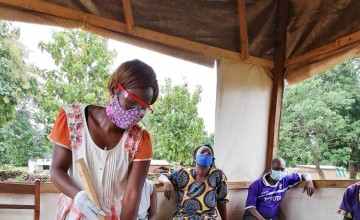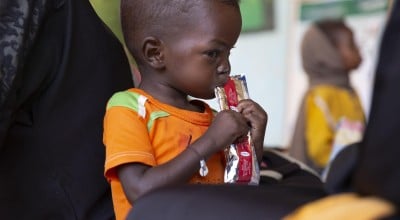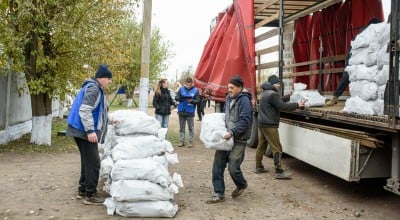
Read our 2024 annual report

Knowledge Hub
As the world eagerly awaits the rollout of COVID-19 vaccines, many developing countries are still facing huge challenges in dealing with the devastating impact of the virus.
Central African Republic (CAR), often described as the ‘world’s poorest country’, is dealing with one of the toughest struggles as it faces into the pandemic with a lack of health infrastructure and an unfolding hunger crisis.
A struggling health system
CAR is home to around 4.6 million people. On March 14th 2020, the country confirmed its first positive COVID-19 case. Since then, more than 4,900 positive cases have been confirmed in the country. At time of publication, there have been 63 deaths.
While those numbers may appear low when compared to European countries, what is sure is that CAR’s struggling health system is profoundly ill-equipped to deal with a pandemic of this scale.
Concern has been working in CAR for over six years and the team quickly moved to launch an immediate response to the outbreak in April 2020. With just three ventilators for a country with the population of Ireland, Emergency Programme Manager for COVID-19 Gloria explains that the country lacks even the most basic health structures.

“Sometimes the health centres we are working with are just buildings with almost nothing inside, just few basic materials and three or four village volunteers who are not professional doctors. They don't have the training and enough technical abilities, especially in the small rural health centres spread around the local villages. In Europe, you use machines. It's just not possible here where most of the country has no access to energy. The entire system is unfortunately very weak.”
Conflict and hunger
Before COVID-19, CAR was already facing major challenges. In 2018, the Global Hunger Index, published by Concern and Alliance 2015 partner WeltHungerHilfe, listed CAR as the only country in the world with ‘extremely alarming’ levels of hunger.
The country has suffered from frequent coups and periods of violent conflict. The most recent conflict began at the end of 2012 and forced millions to flee their homes. It also caused a surge in hunger levels.
At the height of the conflict, fields in many areas were trampled or burned and for a largely rural population, where growing your own food is integral to obtaining enough nutritious food for a balanced diet, this is a huge problem. Food reserves, seed stores and livestock were also looted, and much of the infrastructure was destroyed.
While conflict is by no means the sole perpetrator of global hunger, it is the main driver and has left the population of CAR in an extremely precarious position facing into the COVID-19 outbreak.

Fear of economic ruin
At the start of the global pandemic, Gloria says there were fears in CAR that economic ruin was just around the corner.
“Life here hasn't really changed in the sense that people are living as they always did," she said,
"What has changed is the economic impact. When the crisis hit, movement from Cameroon to CAR was reduced and prices of essential goods like food quickly increased. To respect social distancing, people were afraid to go to local markets and also asked not to move in crowds to reach the villages.
"It is very common in CAR that four or five people to ride all together on a motorbike and the buses and cars that move from the capital to the villages are always overcrowded. There were difficulties in that sense."
She added that while prices have stablised in recent months, there is a lack of understanding around the true impact of COVID-19 in CAR.
“It's stable right now, but many people, particularly in rural context, are not accepting the COVID-19 precautions. It's very difficult to say if there has been an increase in positive cases too, since the number of people living in rural areas that ask to be tested here is quite low. Right now, there is around one new case every week but if people are sick, they die. That is not questioned. They could die from COVID-19 or for any other reason. It doesn't make a difference.”
Even before the global pandemic, Central African Republic faced a variety of other diseases. CAR is a yellow fever endemic zone country and conditions such as malaria, leprosy and tuberculosis are common.
Prevention by education
When the crisis hit in March, Concern’s teams were prepared for action.
Raising awareness of COVID-19 and the simple steps that should be followed to prevent the spread of the virus is key in a country like CAR. Since the beginning of the outbreak, Concern has reached around 30,000 people in CAR with its COVID-19 messaging, both directly and indirectly. This is done in two ways.
In more isolated villages, Concern is identifying and training influential community members on best practice to prevent COVID-19. Once these people are trained, they spread the word to their friends, family and neighbours.
“One person should be able to reach an entire village,” said Gloria.
“By the time this programme is complete, we should have reached around 40 to 50 thousand people with messaging.”
A number of health centres have also been strategically targeted in selected areas. Concern teams train the medical and general support staff on what COVID-19 is and the best ways to prevent it. There is also specific training on cleaning and disinfecting and how to protect people that present with COVID-19 symptoms.
Personal Protective Equipment (PPE) and disinfectant is also provided to each health centre. This programme is possible thanks to support from Irish Aid, the Bureau for Humanitarian Assistance of the United States Agency for International Development (USAID BHA) and UNICEF. The BHA-funded project is being implemented as a consortium alongside the NGOs International Medical Corps (IMC), Danish Refugee Council (DRC) and Oxfam, which are coordinating their efforts to fight the spread of the pandemic, in support of the Ministry of Health and Population.
While news of lifesaving vaccines emerged in November, it is likely that these will take some time to reach countries such as CAR. Gloria says she hopes poorer countries have fair access.
“Our staff members are extremely relieved to know that things are moving in Europe and that a solution may be found soon”.
“Africa is always last in line for these things, but I hope that a fair distribution of the vaccine will take place around the world.”
Although COVID-19 has affected all countries around the world, Gloria asked the Irish public to remember those in the world’s poorest places.
“I would like to highlight the need to keep helping people here, especially when it comes to the health needs. I know the situation in Ireland is hard, the health system and the economy have been severely hit by the pandemic, but imagine what the situation is like here. Please keep helping.”
Our work fighting COVID-19
The COVID-19 pandemic presents an unprecedented challenge for countries all over the world - but Concern remains committed to our humanitarian mission.





